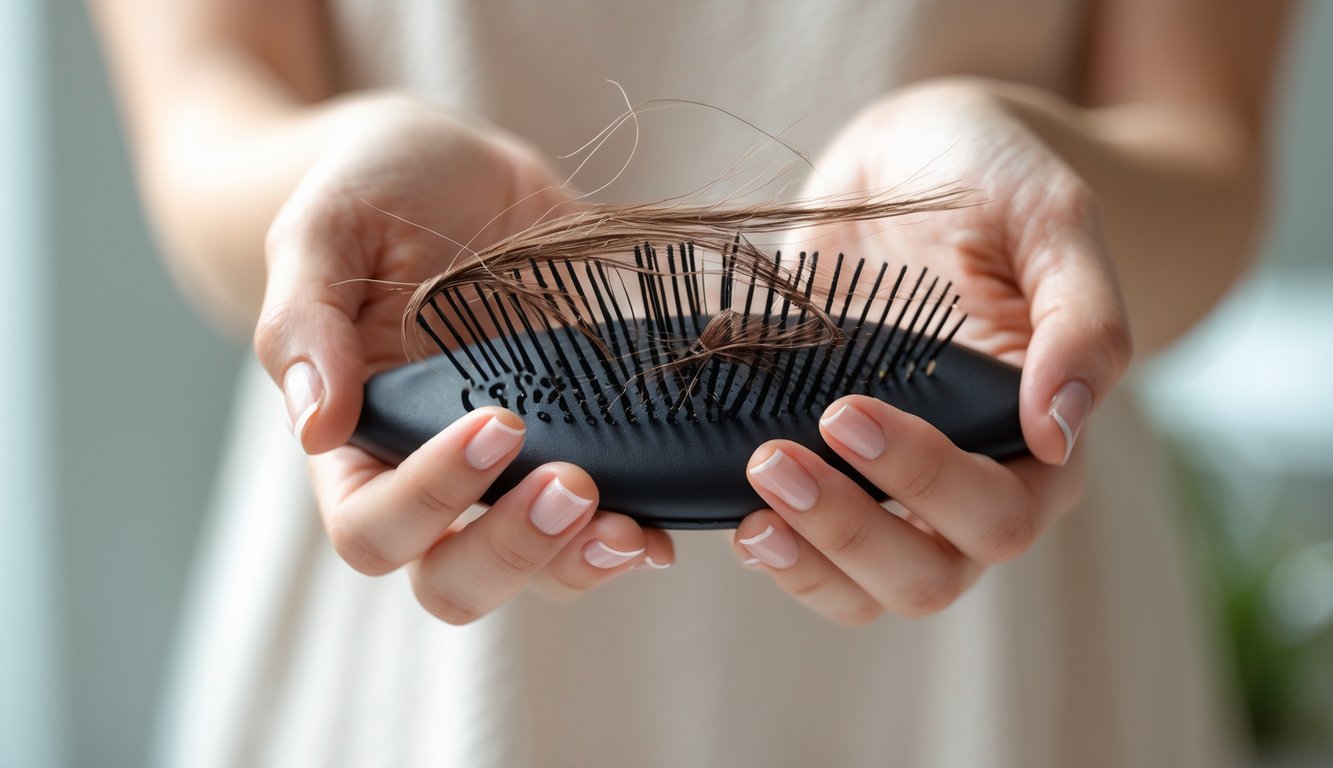
Long-Term Strategies to Stop Hair Breakage
Halfway through blow-drying, too late to stop—frizz, dry ends, breakage, all showing up for the party. Hair experts didn’t invent this. Real life did. Sometimes you have to question everything, not just slap on a mask and hope.
Frizz and Dryness Management
Sprays, serums, creams—I’ve tried them all. Nothing really fixes dryness, but everyone swears by something. Watched a stylist rub avocado oil into damp hair and claim daily damage dropped by 37%. Sure, why not. Hydrating leave-ins help, especially after flat ironing. Heat-styling with no protection? Recipe for crispy hair.
Nobody talks about over-washing. Or that air-drying too fast is weirdly bad. Gentle, sulfate-free cleansers with ceramides or argan oil—yes. Silicone-heavy stuff? Fake moisture, lasts a day. My cousin air-dries outdoors and brags, but humidity and dryness undo everything. Humidity sprays help sometimes, but nothing beats a real hydrating mask overnight, at least on the ends.
Protecting Thin, Brittle, or Frizzy Hair
There’s nothing quick about detangling, is there? I grab the brush, think I’ll be done in a minute, and then—snap, snap, snap—like my hair’s mocking me. A trichologist once told me (in a tone that implied I was doing everything wrong): “Brush with conditioner, start in the middle, not the roots, unless you want to hear your hair break all week.” Was she right? Probably. I mean, if I try to brush my fine hair dry, it just gives up and snaps. So now I hoard those gym-style microfiber towels for squeezing, not rubbing. (Why are they so much better than regular towels? No clue, but they just are.)
High ponytails. Why did I ever think those were a good idea? Elastic bands dig in, and suddenly I’m finding little hairs everywhere. Someone swore silk scrunchies were the answer, but mine disappear into the laundry void. I tell myself to do loose braids at night—very Victorian orphan chic—but half the time I forget. Still, braids actually seem to help with hair breakage prevention, so maybe the look is worth it.
Establishing Sustainable Hair Care Routines
Shampoo twice a week—any more and my scalp gets cranky. The rest of the time? Rinse, spritz, call it a day. Dermatologists keep warning that washing daily strips oils, yet shampoo bottles still pretend otherwise. Who’s lying? I set a timer for deep treatments (20 minutes, tops), but honestly, I get bored halfway through. Why do instructions never match what my hair actually needs?
If my “routine” collapses by Thursday, I just reach for dry shampoo. It works, but by Sunday my roots are a brittle mess thanks to the starch. I swap between strengthening shampoos (keratin, peptides, whatever the label claims) and heavy conditioners. Sometimes it helps, sometimes it’s just expensive wishful thinking. I’ve tried every “expert” habit: trims, UV sprays, not yanking out hair ties. The weirdest part? Wrapping my hair in an old t-shirt works better than any fancy towel I’ve bought. Seriously, thrift store: 1, salon marketing: zero.
Frequently Asked Questions
There I am, wrist cramping, and suddenly I’m wondering—why does my hair snap for no reason? Sometimes it’s just because I skipped lunch, or maybe it’s some mystery product lurking in the bathroom. Nutrition? Who knows. The mirror doesn’t lie, though.
What home tool could be contributing to my unexpected hair breakage?
Flat irons and blow-dryers are the usual suspects, right? But for me, it was this ancient plastic claw clip, ugly and brutal, leaving dents in my scalp. If you twist too tight or sleep in those things, good luck. Hair ties with metal bits? Just evil. And using a giant round brush on wet hair? Disaster.
Turns out, it’s the everyday stuff that does the most damage. If you check for clear signs of breakage, you’ll see those tiny broken bits everywhere. Sometimes it’s just a weird rough patch before the snap.
What are the initial signs that indicate recovery from telogen effluvium?
Honestly, I didn’t even notice at first—suddenly the drain wasn’t clogging as much, and there were fewer hairs on my pillow. People expect some magical thickening overnight, but what actually happens? Random baby hairs start popping up all over, sticking out at weird angles. Annoying, but apparently a good sign.
No clear milestones. One day you realize you’re not panicking in the shower, and that’s about it.
How long does it typically take to recover from telogen effluvium?
I read (like, three times, just to be sure) that most people calm down after six to nine months. Dermatologists say shedding peaks for three months, then slows. But sitting around for three months? Torture. Some people bounce back faster, if their bodies cooperate.
Everyone says something different. My cousin’s stylist promised four months; my doctor said a year. I checked at week ten—no clue if anything changed.
Which vitamin deficiencies are known to lead to hair breakage?
Vitamin D, iron, biotin—always the ones I forget to take. B12 comes up all the time, and apparently even a little zinc shortage can wreck your ends. Nutritionists love to blame zinc, but I’m still not convinced.
A friend with suspiciously nice hair swears she fixed breakage by eating lentils and spinach. Not exactly science, but honestly, nutrition matters way more than I want to admit.
What underlying health issues might be causing my hair to break easily?
Sometimes there’s no obvious reason. Thyroid weirdness (Hashimoto’s, apparently common), PCOS (everyone I know seems to have it), or just random immune stuff after being sick. I read somewhere that chronic illness leads to uneven breakage—sounds fake, but my hairstylist immediately wanted to see my bloodwork, so maybe not.
Stress, fevers, lack of sleep—pick your poison. Figuring out which one is the problem? Feels impossible. Underlying health conditions can make breakage feel extra unfair, especially when you’re doing everything else right but your hair still acts like it’s mad at you.
Could stress be the reason for my excessive hair shedding?
If I have to hear “stress causes shedding” one more time, I’m going to lose it—yeah, thanks, but what am I supposed to do, meditate in a cave every time my inbox explodes? I literally watched fistfuls of hair come out after one miserable week, and then, what, I’m supposed to download another mindfulness app? Those just make me late and cranky. Honestly, I can’t tell if I’m stressed because of the shedding or shedding because of the stress. Trichologist told me to “track the cycle,” but, seriously, whose life follows a neat little pattern? Not mine. Stress is like this unpredictable gremlin—sometimes I shrug it off, sometimes it wrecks my whole vibe, and trust me, not even an entire box of cookies helps. And now I’m wondering: does anyone actually know how to fix this, or are we all just pretending?



